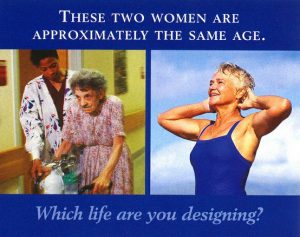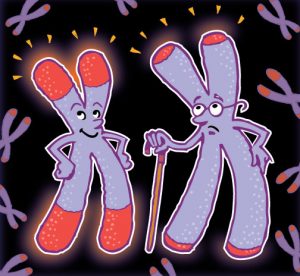Educating and Empowering You to Heal, Thrive, and Live a Happy, Healthy Lifestyle
 Healthy Aging, Look Younger & Live Longer
Healthy Aging, Look Younger & Live Longer

The best healthy aging tips and secrets to look younger naturally without dieting, deprivation or plastic surgery, feel your best and live longer.
Aging is an inevitable process that is influenced by our genetics, lifestyle, diet and environmental factors. Fatigue, low energy, bloating, weight gain, aches and pains, low testosterone, brittle bones and memory loss are not inevitable consequences of aging and getting older. Conventional thinking is that the older you get, the sicker you get. In actuality, the older you get the healthier you have been.
 You can choose to either embrace the aging process with a positive mindset and make choices that support a healthy lifestyle so you age gracefully or you can accelerate aging with a fear-based mindset and unhealthy lifestyle choices.
You can choose to either embrace the aging process with a positive mindset and make choices that support a healthy lifestyle so you age gracefully or you can accelerate aging with a fear-based mindset and unhealthy lifestyle choices.
Remember, cancer, autoimmune disorders, diabetes, sickness and lifestyle diseases do not manifest overnight. No one gets Alzheimer’s, cardiovascular disease, diabetes, cancer or any degenerative disease out of the blue at age 50, 60 or 70. The process starts decades earlier. Your lifestyle and the choices you make in your 20s and 30s show up in your 40s, 50s and beyond. It’s never too late to change, make smarter and healthier choices, and a place where health thrives.
“75% of an individual’s health after age 40 is dependent upon what they have done to their genes, not the genes themselves. Aging is the breakdown of cellular communication.” – Jeffrey Bland, PhD
There are basic categories of aging that impact how we age: intrinsic (what happens on a cellular and metabolic level), photo (sun exposure), environmental (what you’re knowingly and unknowingly exposed to daily including dietary and lifestyle choices, chemicals, EMFs, toxins), and epigenetics (gene expression: turning on or turning off certain genetic factors).
Telomeres
Telomeres are the end caps of chromosomes. Those with shorter telomeres are more susceptible to diseases, and have a shorter lifespan compared to those with longer telomeres.
Although we cannot change our DNA, we can alter which genes are expressed – which genes we turn  on or which genes we turn off (epigenetics) – through choices, environmental exposures and behaviors that can change the expression of our genes by influencing a network of chemical switches within our cells collectively known as the epigenome.
on or which genes we turn off (epigenetics) – through choices, environmental exposures and behaviors that can change the expression of our genes by influencing a network of chemical switches within our cells collectively known as the epigenome.
These behavioral and environmental factors include diet, lifestyle, stress, thoughts, toxic exposure and other factors that activate chemical switches that regulate gene expression. Food in particular is known to alter the epigenetics of animals on different diets. You are not only what you eat, but potentially what your mother ate, and possibly even what your grandparents ate.
Oxidation accelerates the aging process, and damages DNA, proteins and lipids (fatty substances) caused by pro-oxidants, which are produced from the air we breathe, smoking, over-exercising, chronic stress (including emotional, spiritual, electromagnetic, environmental and mental stress), inflammatory foods and poor diet, excessive sun exposure, infections, toxins, chemical exposure and inflammation. Under these circumstances, antioxidants are depleted and must be replaced continuously in order to delay the otherwise inevitable deterioration that leads to any one of the top three killers: inflammation, oxidative stress and immune dysfunction.
Stress and inflammation are two controllable factors that independently shorten telomere length and increase cellular aging.
Inflammation is a silent killer that accelerates the aging process, is responsible for nearly all diseases, and occurs from any number of things including our food choice, stress, nutrient deficiencies, underlying infections and so much more. Over time inflammation causes premature aging, weight loss resistance, hormonal imbalances, cognitive dysfunction, and a laundry list of health problems and eventually leading to disease.
Glycation occurs when glucose (sugar) from what the foods you choose to eat binds to some of your DNA, proteins and lipids leaving them unable to do their job thereby increasing oxidation and free radicals. The problem becomes worse as we get older, causing body tissues to malfunction, resulting in disease and death.
10 Determinants of Aging
-
Muscle Mass
-
Strength
-
BMR (basal metabolic rate) determined by thyroid function and muscle mass
-
Percent body fat
-
Aerobic capacity
-
Blood Sugar
-
Cholesterol
-
Blood Pressure
-
Bone Mineral Density
-
Temperature Regulation
Degenerative diseases of aging are not genetic, they do not happen overnight; these diseases are acquired. Degenerative diseases including osteoporosis, stroke, Alzheimer’s disease, heart disease, type 2 diabetes and other diseases that occur as we age are byproducts of a metabolic imbalance, unhealthy lifestyles, imbalances within the body, and a deeper underlying problem. —Diana Schwarzbein, M.D.
Warning signs of accelerated aging include but are not limited to chronic heartburn and digestive dysfunction, insomnia, hypertension, bone loss, excess belly fat, muscle loss (sarcopenia), depression, anxiety, allergies, and many other ailments. Symptoms may include problems with memory, digestion, aches and pain, low energy, foggy brain, PMS symptoms and many others. These are red flags and must be addressed, identified and dealt with to prevent chronic degenerative disease. We are not an NSAIDs, statin drug or any other drug-deficient society. Drugs are never the answer; they’re just a band-aid with damaging side effects.
The solution is to address and identify the originating root cause and determine the underlying reason why there is an imbalance in the first place that is causing you to age faster than you’d like.
Start with the foods you choose to eat. Food is powerful information that is either a form of poison or healing medicine – you get to choose every time you load up your fork. Insulin and oxidative stress are controlled and managed by stabilizing blood sugar and eating a nutrient-dense diet enriched with vitamins, minerals, anti-oxidants, amino acids and phytonutrients. The foods you choose to eat can support a more youthful appearance, a healthy brain, encourage fat loss and optimal health, or promote disease, oxidation, glycation and accelerate the aging process. It’s a choice. Diet is an essential component of aging.
HAPPY, HEALTHY AGING
Look Younger, Feel Better and Live Longer
• Use food as medicine for healthy aging. Those whose diets are primarily plant-based with a diversity and variety of organic leafy greens and vegetables tend to have the healthiest looking skin and hair, feel better, experience less disease and live longer. Include plenty of healthy fats and an adequate amount of protein. Follow the lifestyle principles in The Power of 4 and Fat Loss Revolution!
• Time restricted feeding. Intermittent fasting. Close up the kitchen by 7:00pm. No late night snacking. Wait until 7-8am or lunchtime to eat.
• Move more. Find an activity you enjoy. Walk daily, ideally outdoors and in nature.
Walking lessens genetic influence toward obesity by 50%, boosts serotonin, releases feel-good endorphins, lowers cortisol, improves insulin sensitivity, and nourishes the soul.
• Lift weights to build lean muscle tissue, increase strength, optimize hormones and prevent dynapenia (loss of strength that occurs with age) and sarcopenia (loss of muscle that occurs with age). Strength training with heavy weights increases muscle strength up to 227% and increases in muscle mass up to 11.4% in men aged 60-72. Studies have found similar training in frail elderly (87-93 years of age) resulted in a 189% increase in muscle strength and 11% increase in muscle size in just eight weeks.
• Yoga, prayer and other forms of meditation counteract the harmful effects of stress and have an observable, biological effect. Just one session of relaxation-response yoga practice was enough to enhance the expression of genes involved in energy metabolism and insulin secretion, and reduce expression of genes linked to the inflammatory response and stress. There was an effect even among novices who had never practiced before. Genes associated with energy metabolism, mitochondrial function, insulin secretion and telomere maintenance were turned on, while those involved in inflammation were turned off with effects more pronounced and consistent for long-term practitioners.
• Stretch! Mind-body practices such as yoga turn on certain genes that trigger beneficial responses in the body and the brain. A consistent yoga practice engages areas of the brain that encourage a healthier response and perception to stress, improved immunity, increased spine density and flexibility, and even properties associated with slowing down the aging process.
• Meditation. Slow down age-related brain atrophy and induce brain growth with meditation; not only does it prolong life meditation enhances the quality of life. In a study published last year, scientists at the University of California at Los Angeles and Nobel Prize winner Elizabeth Blackburn found that 12 minutes of daily yoga meditation for eight weeks increased telomerase activity by 43%, suggesting an improvement in stress-induced aging.
• Nature and Sunshine! Get a daily dose of natural vitamin D from the sun. Walk every single day. Spend more time in nature without a cell phone.
• Stay mentally active: pursue education; creativity; brain stimulation (puzzles, word games, playing a musical instrument). Never stop learning.
• Relax, rejuvenate, recover and restore. Chronic stress accelerates aging, inflammation, oxidative damage, adrenal dysfunction, degeneration and disease. Rest is your secret weapon against stress. Women are more sensitive to the stress hormone cortisol compared to men and are less able to adapt when levels are out of balance. Women with high levels of “perceived” stress have shorter telomeres, indicating that they have a cell age 10 years ahead of their biological age. The good news is that telomeres can recover from chronic stress when relaxation techniques are consistently practiced. Practice de-stressing, parasympathetic activities every day. Practicing daily breath-management techniques and having a better understanding of stress can help build resilience. Rest and relaxation shift the body into the parasympathetic branch of the autonomic nervous system, known as the “rest and recovery” system.
• Sleep! It’s the fountain of youth and has a tremendous impact on longevity, telomere length, the appearance of your skin, brain function and overall health physically, mentally and emotionally.
• Balance hormones naturally, specifically insulin, cortisol and thyroid.
Annual blood work to balance your body chemistry and detect any nutrient deficiencies such as folate, vitamin B12, fatty acids. Lab markers that increase risk of disease include increased levels of iron, ferritin, CRP, insulin, A1c, glucose, fibrinogen and homocysteine. Rule out underlying infections, assess thyroid function, metabolic dysfunction, heavy metal toxicity and underlying sources of inflammation.
• Reduce inflammation. An inflamed body is an inflamed and irritable brain.
• Practice gratitude, compassion and self-love. Adopt a positive attitude and coping skills (make lemonade out of lemons).
• Detox periodically. Be aware of toxins in your home, food, water, and the environment, and the detrimental effects they have on your health. These include pesticides, GMOs, glyphosate, toxic chemicals, artificial sweeteners, personal care and cleaning products, EMFs, heavy metals, xenoestrogens, obesogens, BPA, phthalates and many others.
• Surround yourself with like-minded people who love, value and support you; people and things that nourish your mind and soul; and an environment that soothes your soul. Realize that sometimes winning means walking away whether it be leaving a toxic relationship, city, job or anything else. Determine your purpose. Follow your passion.
You can be eating the healthiest, organic foods, moving your body and meditating every day, and taking the highest-quality supplements, but if you’re in a miserable, unfulfilling job or toxic relationship, have a negative, doom-n-gloom, victim mindset, or there’s deep underlying emotional pain and turmoil that has not been dealt with true healing, health and happiness will evade you.
• Build good digestion. Ensure a healthy functioning gut, optimize digestion, identify underlying infections, a healthy microbiome and eliminate inflammatory foods.
• Avoid the flu shot, vaccines, OTC and prescription medicatio ns that damage mitochondrial and have damaging side effects: statin drugs, antacids, antibiotic overuse, flu shots, antidepressants, Tylenol and others.
•Rule out underlying infections: dental infections, Candida overgrowth, dysbiotic bacteria, fungal, yeast, parasite, H.pylori, viral infections, Lyme disease and mycotoxicity (mold)
• Reduce toxic load and chemical exposure. Heavy metal toxicity, chemicals in the food we eat, water we drink and bathe in, the air we breathe, and products we put on our skin and use in our homes and gardens.
• If you choose to drink alcohol, enjoy an occasional glass red wine, preferably organic Pinot Noir since it contains the highest content of resveratrol.
• Take high-quality supplements and nutraceuticals, antioxidants, vitamins and minerals to correct any underlying nutrient deficiencies and support your biochemistry.
Related Articles
- Healthy Brain, Better Memory & how to Reduce Risk of Dementia
- Berberine Activates Autophagy
- Video: Ketones – Brain Fuel

